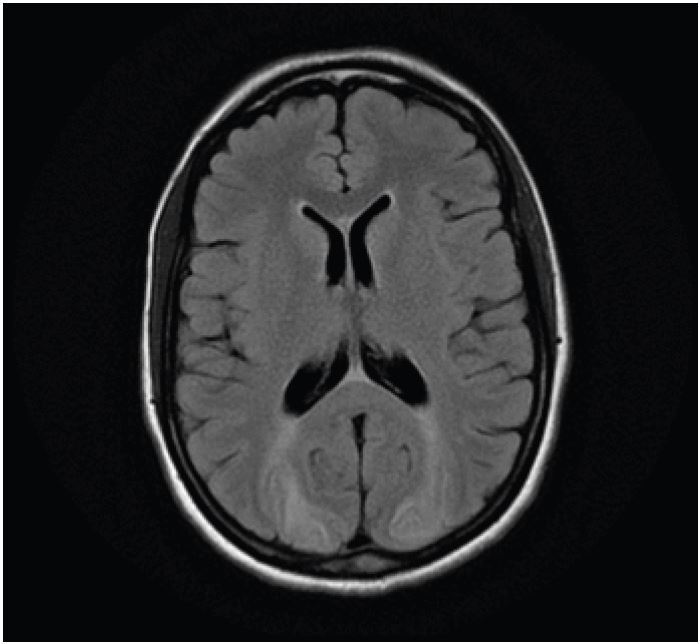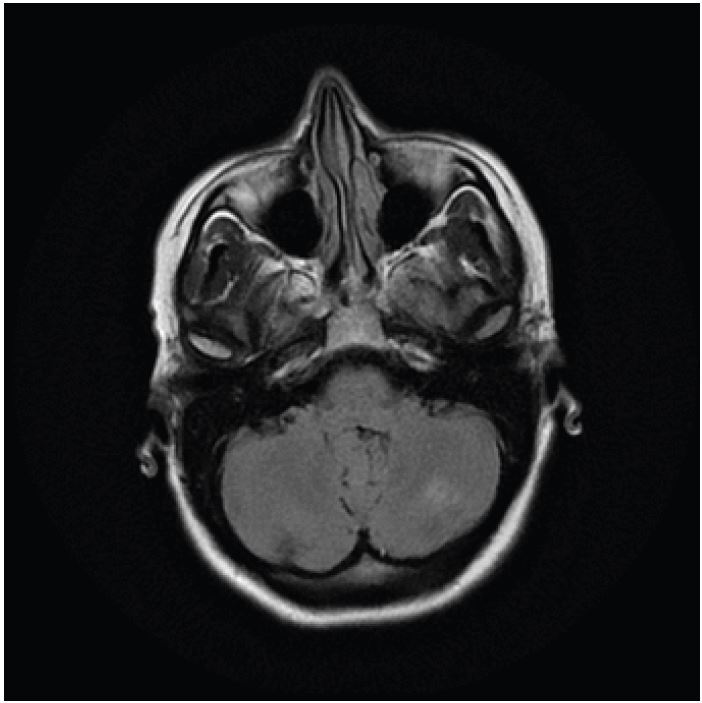| Author | Affiliation |
|---|---|
| Tara Murphy, | Dalhousie Medical School, Nova Scotia, Canada |
| Khalid Al-Sharief, MD | Upper River Valley Hospital, Waterville, New Brunswick, Canada |
| Vineeta Sethi, MD | Upper River Valley Hospital, Waterville, New Brunswick, Canada |
| Gurpreet S. Ranger, MS, FRCS | Upper River Valley Hospital, Waterville, New Brunswick, Canada |
ABSTRACT
Posterior reversible encephalopathy syndrome (PRES) is an unusual condition typified by acute visual impairment caused by sudden, marked parieto-occipital vasogenic edema. Thought to be inflammatory in origin, it has been described in patients undergoing chemotherapy, with autoimmune disease, and in some infections. We report a case of PRES that occurred one week after an episode of acute pancreatitis in an otherwise healthy 40-year-old female. There was progressive visual impairment over a 24-hour period with almost complete visual loss, with characteristic findings on magnetic resonance imaging. After treatment with steroids, the visual loss recovered. Clinicians should retain an index of suspicion of this rare condition in patients with visual impairment after acute pancreatitis.
INTRODUCTION
A 40-year-old female presented to our emergency department with sudden visual loss over a 24-hour period. She was otherwise healthy, but had been admitted two weeks previously with an episode of acute pancreatitis secondary to alcohol intake from which she had recovered uneventfully, and without any obvious sequelae. An urgent magnetic resonance imaging (MRI) scan was performed. This revealed symmetrical areas of hypoattenuation in both posterior parieto-occipital and cerebellar regions (Figures 1, 2). She was seen by a neurologist and diagnosed with posterior reversible encephalopathy syndrome (PRES). After a two-month course of steroids she had almost complete resolution of her vision and the radiological changes had improved.


DISCUSSION
PRES is extremely rare, and usually diagnosed by a history of sudden visual impairment in the presence of specific radiological changes on MRI. Bilateral symmetrical hypodensitities in the parieto-occipital areas and cerebellar hemispheres on imaging are characteristic. The condition has been associated with chemotherapy, hypertension, infection and autoimmune disease.1
It is thought to occur from temporary impairment of the blood brain barrier causing vasogenic edema with symptoms of reduced consciousness, seizures, headaches, and typically visual problems.2 Around 26–67% of patients with PRES present with visual symptoms of blurred vision, visual neglect, homonymous hemianopsia, hallucinations or cortical blindness.
Our case is unusual, as PRES caused by pancreatitis has only been reported in very sick patients with other comorbidities. It probably occurred in this case as a result of the systemic inflammatory response.3,4,5,6
Whilst pancreatitis itself can be life threatening, this case reminds clinicians of unusual complications that can occur after discharge of patients who seem to have recovered from the disease.
Footnotes
Section Editor: Sean O. Henderson, MD
Full text available through open access at http://escholarship.org/uc/uciem_westjem
Address for Correspondence: Dr. Gurpreet Singh Ranger, Chief of Surgery, Surgeons’ Offices, Upper River Valley Hospital, Waterville, New Brunswick, Canada, E7P 0A4. Email: gsinghranger@yahoo.co.uk. 12 / 2015; 16:1173 – 1174
Submission history: Revision received August 4, 2015; Accepted August 12, 2015
Conflicts of Interest: By the WestJEM article submission agreement, all authors are required to disclose all affiliations, funding sources and financial or management relationships that could be perceived as potential sources of bias. The authors disclosed none.
REFERENCES
1. Legriel S, Pico F, Azoulay E. Understanding Posterior Reversible Encephalopathy Syndrome”. Annual Update in Intensive Care and Emergency Medicine. 2011:651-53.
2. Feske SK. Posterior Reversible Encephalopathy Syndrome. Semin Neurol. 2011;31(2):202-15.
3. Shen FC, Hsieh CH, Huang CR, et al. Acute Intermittent Porphyria Presenting as Acute Pancreatitis and Posterior Reversible Encephalopathy Syndrome. Acta Neurol Taiwan. 2008;17(3):177-83.
4. Yamada A, Atsumi M, Tashiro A, et al. Recurrent Posterior Reversible Encephalopathy Syndrome in Nephrotic Syndrome: Case Report and Review of the Literature. Clin Nephrol. 2012;78(5):406-11.
5. Nishimoto M, Koh H, Bingo M, et al. Posterior Reversible Encephalopathy Syndrome following Acute Pancreatitis During Chemotherapy for Acute Monocytic Leukemia. Rinsho Ketsueki. 2014;55(5):552-7.
6. Baek HS, Lee SJ. A Case of Posterior Reversible Encephalopathy Syndrome Associated with Acute Pancreatitis and Chronic Alcoholism. Gen Hosp Psychiatry. 2015;37(2):192.e3-5.


